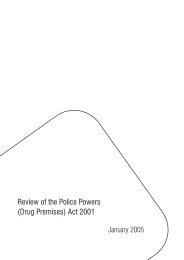Crimes (Forensic Procedures) Act 2000 - NSW Ombudsman - NSW ...
Crimes (Forensic Procedures) Act 2000 - NSW Ombudsman - NSW ...
Crimes (Forensic Procedures) Act 2000 - NSW Ombudsman - NSW ...
You also want an ePaper? Increase the reach of your titles
YUMPU automatically turns print PDFs into web optimized ePapers that Google loves.
The Anti-Discrimination Board expressed concern that people with disabilities which affect capacity are “particularly<br />
vulnerable” and suggested police officers should be given greater assistance to help determine whether a person<br />
may be incapable for the purposes of the <strong>Act</strong>. 487<br />
We note that many police officers told us they regularly conduct forensic procedures on suspects who appeared not<br />
to understand the information provided by police, although they generally attributed this to the length and complexity<br />
of the information rather than the capacity of the suspect. We discussed our concerns about the way forensic<br />
procedures are explained to suspects and volunteers above, at 6.1.2.<br />
Through our monitoring activities, we found that police officers have made very few applications for orders authorising<br />
forensic procedures to be conducted on incapable persons. None of the magistrates who responded to our survey<br />
had dealt with an application involving an incapable person. In our audit of police local area commands, there were<br />
no records of any such applications, and none of the police officers we interviewed could recall ever having made<br />
one. In our survey of local area commands, almost every command advised either that it had never obtained a court<br />
order in relation to an incapable person, or did not know whether it had. One command advised it had obtained four<br />
orders, and another that it had obtained one. No further information about the circumstances surrounding these<br />
applications could be obtained.<br />
The very small number of applications for orders made in relation to incapable people, in conjunction with comments<br />
by police that they regularly conduct forensic procedures on people who do not understand the information provided,<br />
suggests that police may not in fact be identifying people as being incapable.<br />
The Intellectual Disability Rights Service gave several examples of police either failing to identify a person as<br />
incapable for the purposes of the <strong>Act</strong>, or otherwise treating the person inappropriately.<br />
In January 2005 a client with an intellectual disability was arrested and taken to a police station. Police told her<br />
that she would have to agree to a buccal swab or three police officers would hold her down and sit on her and<br />
use force to pull out 10 hairs. This left the client shaking and crying. A solicitor from our service indicated to<br />
police that our client did not have capacity to understand the enormity of the decision and that she was not in a<br />
position to consent to the procedure. Police asked the solicitor to put this view in writing, which he did. Police<br />
said that the custody sergeant could order that the procedure occur by force. The IDRS solicitor was then called<br />
away to assist another client but requested that police do nothing until a witness was present from our Criminal<br />
Justice Support Network... Police did not ultimately proceed with the taking of hairs. Police made an application<br />
to court but there is no outcome as yet. 488<br />
Another incident involved a suspect charged with a serious assault matter, who had an acquired brain injury and a<br />
mental illness:<br />
Police requested that he provide a sample by buccal swab. The support worker assisted the suspect to obtain<br />
telephone legal advice. The police officer proceeded to read out word for word the required (s 13) information.<br />
He/she said that the suspect would probably not understand but that he/she would read out the information<br />
anyway. The support person then proceeded to explain the s 13 information in a way that the suspect could<br />
understand. 489<br />
The Intellectual Disability Rights Service commented that the police officer had a poor understanding of how to<br />
communicate effectively with a person with an intellectual disability, and that if the support person had not been<br />
present to explain the information in a more appropriate way, the suspect may have consented to the procedure<br />
without understanding its nature or effect. 490<br />
Through our monitoring activities, we also came across instances where it appears that the person being asked to<br />
consent to a forensic procedure may have been incapable.<br />
<strong>NSW</strong> <strong>Ombudsman</strong><br />
DNA sampling and other forensic procedures conducted on suspects and volunteers under the <strong>Crimes</strong> (<strong>Forensic</strong> <strong>Procedures</strong>) <strong>Act</strong> <strong>2000</strong> 91

















